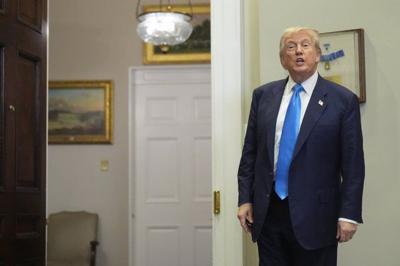WASHINGTON - Canada was hit with 35 per cent tariffs on Friday after U.S. President Donald Trump followed through on his threat to increase the duties if Ottawa didn't make a trade deal.
The White House has said the tariffs would not affect goods compliant with the Canada-U.S.-Mexico Agreement on trade, commonly known as CUSMA.
Prime Minister Mark Carney had tempered expectations of an agreement by Friday, saying Ottawa will only agree to a deal "if there's one on the table that is in the best interests of Canadians."
Carney has described the talks as complex, comprehensive and constructive.
Trump, meanwhile, has complained repeatedly about America's northern neighbour.
"I think Canada could be one where they just pay tariffs – not really a negotiation," he said last week.
Trump signed the executive order Thursday night to slap Canada with the increased duties. A fact sheet from the White House justified the rate change saying Canada "failed to cooperate in curbing the ongoing flood of fentanyl" and also pointed to Ottawa's implementation of retaliatory tariffs.
In a statement from Carney, released just after midnight, he said the government was disappointed by the actions, and said that "Canada accounts for only 1% of U.S. fentanyl imports and has been working intensively to further reduce these volumes."Â
He added that some industries — including lumber, steel, aluminum and automobiles — will be harder hit, but that the government will try to minimize the impact and protect Canadian jobs.Â
Trump has repeatedly delayed his tariff deadlines but his trade agenda saw some successes in the leadup to Friday's deadline. This week, he announced deals with the European Union, South Korea and Pakistan — although many details of the agreements remain unclear.
Frameworks for trade deals with the U.S. have been announced for Japan, Vietnam, Indonesia, the Philippines and the United Kingdom. All of those nations are facing some level of baseline tariff.
The president on Thursday gave Mexico a 90-day extension on its trade negotiations but did not extend a similar offer to Canada.Â
In a separate executive order Thursday, Trump increased his so-called "Liberation Day" tariffs on many other nations, with those duties to be implemented in seven days.Â
Trump's 50 per cent tariffs on semi-finished copper also came into effect just after midnight, but the latest duty exempts the raw input material.
The copper tariffs are landing on top of a growing list of U.S. sectoral duties, which include duties on automobiles, steel and aluminum.
Reaction to the tariffs has been swift, with Canadian Chamber of Commerce president and CEO Candace Laing saying in a statement that the White House's fact sheet was "fact-less."
"More fact-less tariff turbulence does not advance North American economic security. Businesses — in Canada and the U.S. — urgently need certainty," said Laing.
ÎÚÑ»´«Ã½ 80 to 90 per cent of Canadian goods might be able to avoid Trump's higher tariffs because they comply with CUSMA's rules of origin, said Michael Dobner, the national leader of economics and policy practice at PricewaterhouseCoopers Canada.
That doesn't mean all of those exporters have filed the necessary paperwork to avoid the duties, he added.
It's not clear exactly how much of what Canada exports to the United States is CUSMA-compliant.
While no industry can be singled out as the one most at risk, Dobner said, any business that must use many parts sourced outside North America is in jeopardy of increased duties.
Canadian Federation of Independent Business president and CEO Dan Kelly said many small- and medium-sized businesses are worried about facing the brunt of the duties.
They may not have the financial flexibility to change their inputs to North American products easily, or have the capacity to quickly get the paperwork to show CUSMA compliance.
The federation's data shows that, so far, most small businesses are absorbing some or all of the costs associated with Trump's tariffs, under the assumption that Canada will find some sort of solution.
"Is 35 per cent going to be the straw that breaks the camel's back?" Kelly said.
Kelly said if Canada remains in "no man's land" on Friday, Ottawa should release funds collected by retaliatory tariffs to help struggling businesses.
Both Kelly and Dobner said that while the increase in tariffs will be terrible for some businesses, the larger concern for all industries is the ongoing uncertainty that has put a chill on investment.
"Generally speaking, even without that increase, there has been a bit of a freeze in investment in Canada," Dobner said.
This report by The Canadian Press was first published Aug. 1, 2025.

